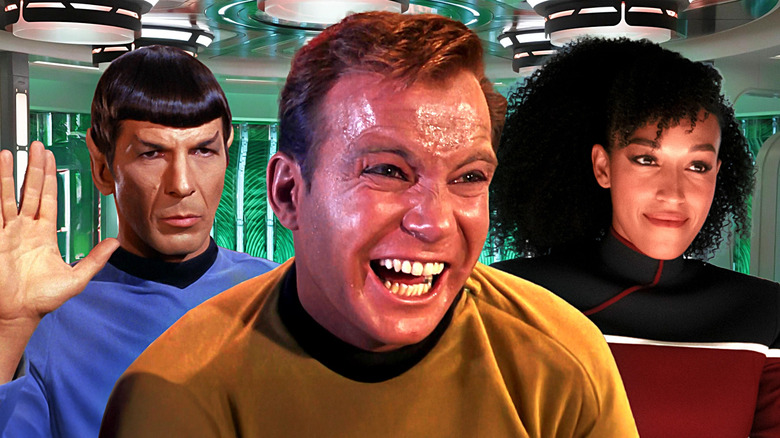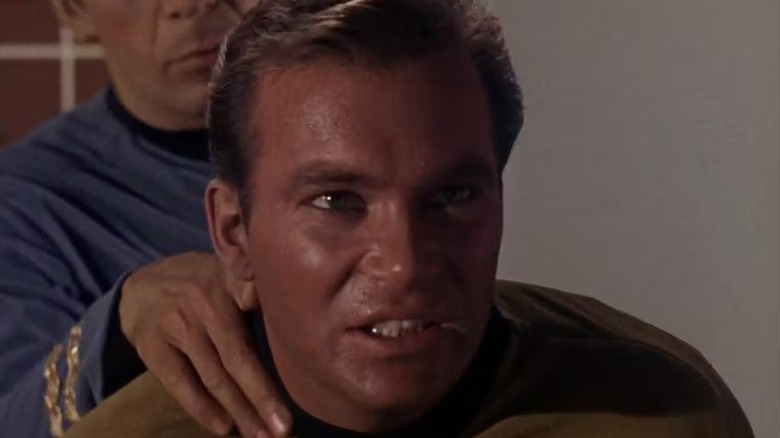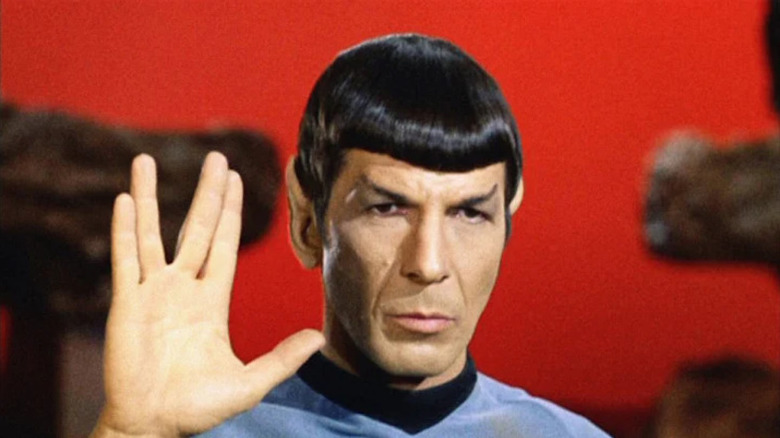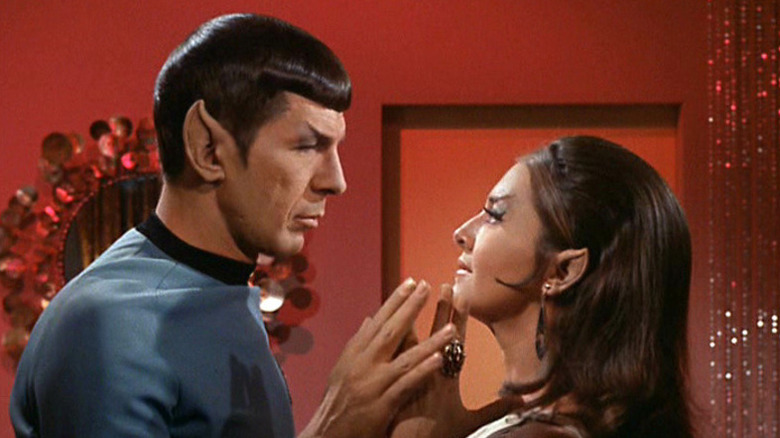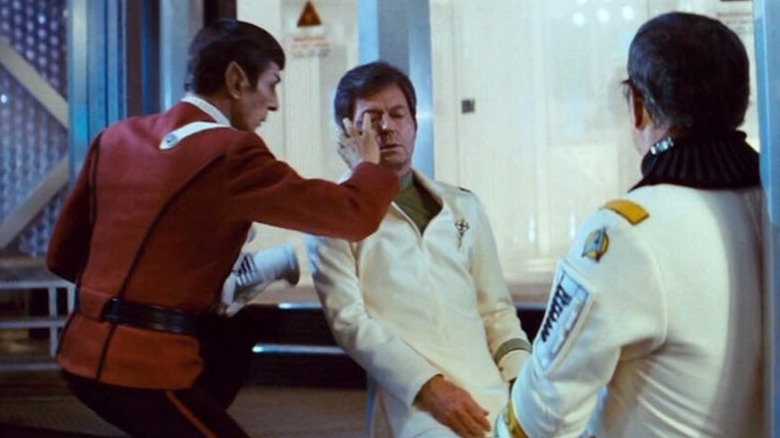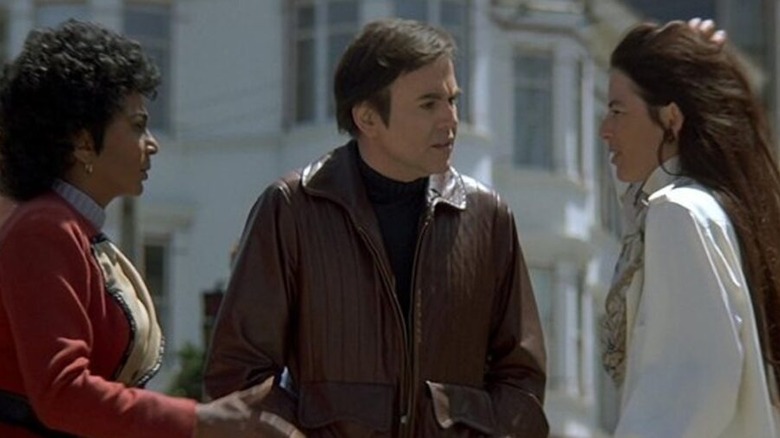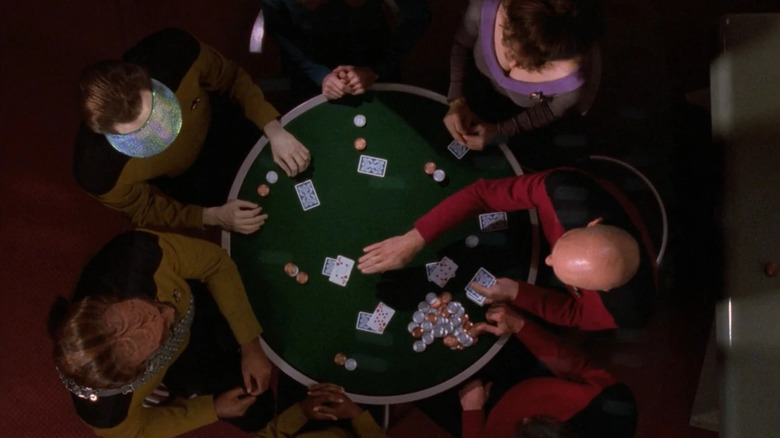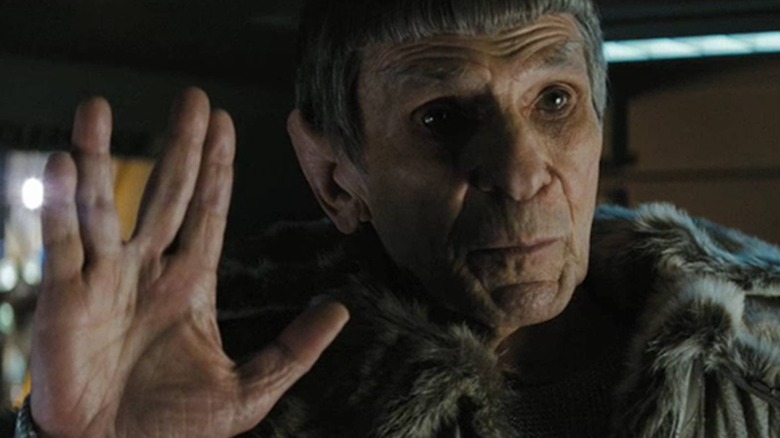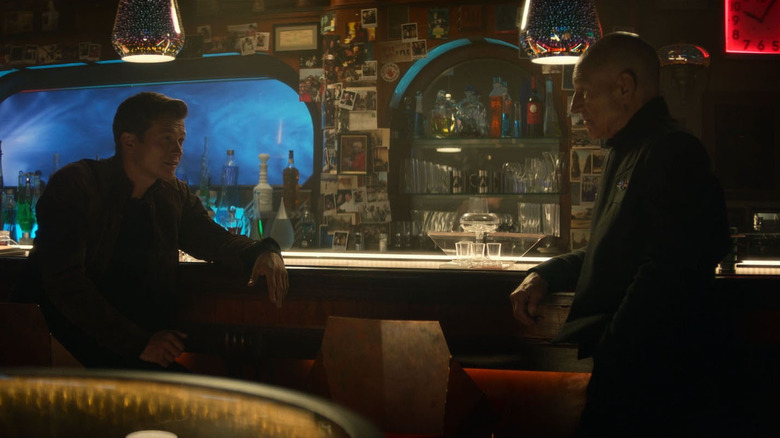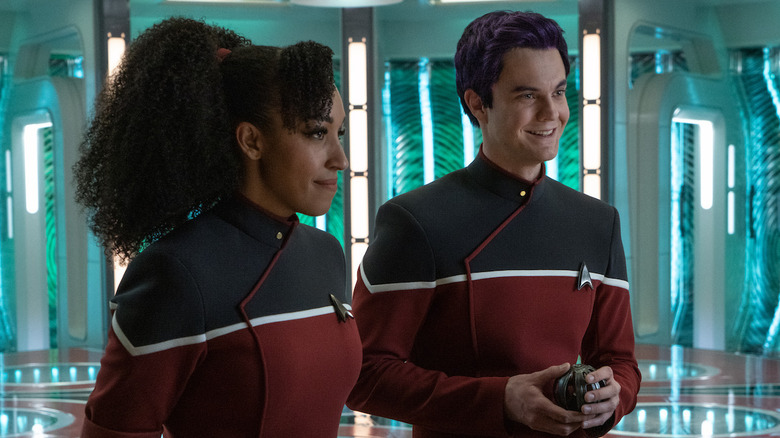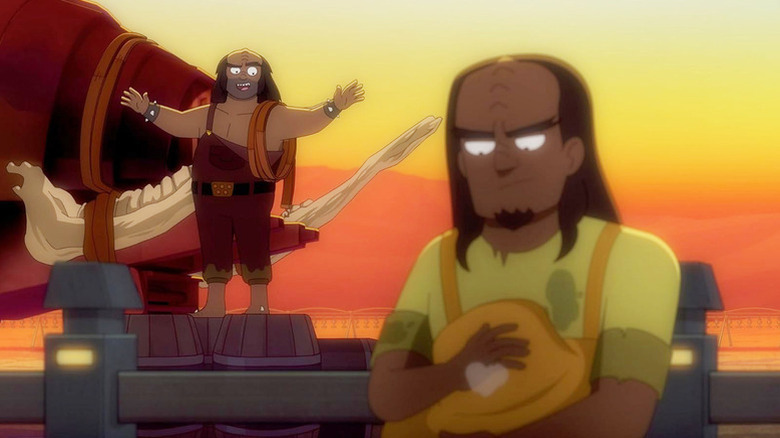10 Star Trek Moments You Didn't Know Were Improvised
For a science fiction franchise as tightly and carefully plotted as "Star Trek," there isn't a tremendous amount of room for its actors to improvise. Given the level of special effects involved, this is expected, but there are moments when performers get to add memorable, unscripted bits to "Star Trek" shows and movies. Particularly in the franchise's early days, scenes improvised by its main characters helped define "Star Trek" into the enduring phenomenon that it would become. Even now, as the sci-fi property finds new life streaming on Paramount+, there are still fan-favorite moments that were initially unplanned by the writers and producers.
Whether it's off-the-cuff suggestions informing foundational elements of major characters or an ab lib that steered the future of the franchise, improv has had an important role in "Star Trek." Sometimes actors intuitively understand their characters in a given moment better than the script allows, and that's led to strong improvisational scenes. While not all of this unscripted riffing makes the final cut, when it does, it always stands out creatively.
Here are 10 "Star Trek" moments that you didn't know were improvised by the actors.
The Vulcan nerve pinch in Star Trek: The Original Series
Throughout the first season, in particular, of "Star Trek: The Original Series," it was clear that the show was still figuring out the nuances of Vulcan culture. This extended to how Vulcans incapacitated any hostile figures, with their signature nerve pinch administered to the shoulder to render a target unconscious. The technique debuted in the first season episode "The Enemy Within," which had Spock (Leonard Nimoy) neutralize a violent manifestation of Captain Kirk (William Shatner) created by a transporter malfunction. However, the nerve pinch wasn't originally included in the episode's script, with Nimoy suggesting the change himself.
The script described Spock knocking out the malevolent Kirk with a swift hit from the butt of his phaser pistol to the back of his head. Nimoy felt this approach was too archaic and violent for the sophisticated Vulcan and his heightened intelligence, offering an alternative as long as the end result was the same. Nimoy came up with Spock's Vulcan nerve pinch hinting at more esoteric Vulcan abilities while opting for a relatively more peaceful solution to the rampaging Kirk. Embraced by the show's producers, the nerve pinch became a staple for the franchise moving forward, with other Vulcan and Vulcan-adjacent characters replicating the technique.
The Vulcan salute in Star Trek: The Original Series
So much Vulcan culture and Spock's mannerisms and abilities were developed by Nimoy himself, something that persisted throughout his long tenure with the "Star Trek" franchise. Another significant contribution that Nimoy brought was in "Amok Time," the second season premiere episode of "The Original Series." Spock greets the respected Vulcan elder T'Pau (Celia Lovsky) with the V-shaped Vulcan hand salute and familiar phrase, "Live long and prosper." Though the catchphrase was attributed to screenwriter Theodore Sturgeon, the now-iconic hand salute was all devised by Nimoy.
More than just a distinct spacing of fingers, the Vulcan salute has a deeper meaning that truly pleased Nimoy on a theological level. Nimoy was inspired by Jewish worship services he attended as a child, with the salute resembling the Hebrew letter shin for the almighty El Shaddai. Performed during holy ceremonies in synagogues, the hand signal is meant to be a divine blessing that symbolically embraces the congregation. In adding new dimensions to Spock, Nimoy drew from his own religious background, intrinsically spreading that idea of gestured holy blessing into Vulcan culture.
Vulcan-Romulan physical affection in Star Trek: The Original Series
The Romulans have had an interesting history and place in "Star Trek" since their introduction in "The Original Series." Physically resembling Vulcans, the Romulans were established as an societal offshoot who applied cold logic to a more war-like presence within the galaxy. The third season episode "The Enterprise Incident" in "The Original Series" has Spock feign defection to the Romulan Empire, romancing a Romulan commander (Joanne Linville) to maintain his cover. In an intimate moment between the two, Spock and the commander demurely touch fingertips in a sign of their growing mutual attraction.
The original script for "The Enterprise Incident" had Spock and the Romulan commander passionately kiss rather than the more restrained show of affection. Feeling this wasn't in line with either Vulcan or Romulan culture as had been depicted at that time, Nimoy convinced the director to opt for the finger caressing instead. This echoed a similar act by Spock's parents Sarek (Mark Lenard) and Amanda Grayson (Jane Wyatt) in the previous episode "Journey to Babel." This subtle way of revealing Vulcan-Romulan romance not only underscored Nimoy's understanding of Vulcans, but helped inform one of Spock's best "Star Trek" episodes.
Spock's parting mind meld with McCoy in Star Trek II: The Wrath of Khan
There could be an entire list of times that Leonard Nimoy contributed to the "Star Trek" mythos in lasting ways beyond his scripted performance. While filming "Star Trek II: The Wrath of Khan," Nimoy improvised one mysterious word changing "Star Trek" history forever. In the 1982 movie's climax, Spock incapacitates Doctor McCoy (DeForest Kelley) with a Vulcan nerve pinch before mind melding with him, uttering only the single word, "Remember." Moments later, Spock dies repairing the Enterprise's warp drive, allowing it to speed away to safety from a nebula-consuming explosion.
After the success of "Wrath of Khan," Nimoy was approached not only to return as Spock for a sequel but to direct it. For Nimoy and screenwriter/producer Harve Bennett, this throwaway line became the key for developing the story for the sequel. 1984's "Star Trek III: The Search for Spock" revealed this word hinted that Spock planted his living spirit into McCoy before heroically sacrificing his physical form. With Spock's body reborn over the course of the sequel, Nimoy's ad lib opened the door for his soul to survive in McCoy long enough for the climactic transfer.
Uhura and Chekhov ask for directions in Star Trek IV: The Voyage Home
When Nimoy returned to the director's chair for 1986's "Star Trek IV: The Voyage Home," his creative vision centered on six rules for the sequel. These axioms were intended to significantly lighten the mood and mitigate the on-screen violence, especially compared to the darker "Star Trek III." The spirit of making a feel-good "Star Trek" movie extended to how Nimoy directed his cast, including a spontaneous scene featuring Nichelle Nichols' Uhura and Walter Koenig's Chekov. After traveling back to 1986 San Francisco, the duo ask locals where a naval base in Alameda is located with little help.
Though the people Chekov and Uhura approach on the street for directions were paid extras, they were instructed to look natural and ignore the two actors' questions. However, extra performer Layla Sarakalo provided an unscripted response, briefly offering unhelpful advice to the pair before continuing on her way. The creative team liked Sarakalo's organic and slightly confused reaction, keeping her scene and dialogue in the finished movie. However, in keeping with production rules, Sarakalo had to be inducted into the Screen Actors Guild for her spontaneous improv.
Picard joins the poker game in Star Trek: The Next Generation
A recurring trope throughout "Star Trek: The Next Generation" had the senior officers regularly convene for a game of poker, though Jean-Luc Picard (Patrick Stewart) was usually conspicuously absent. This changed in the closing scenes of "All Good Things...," ranked highly among the best "Star Trek" finales to date, with Picard finally joining his senior crew for a game. As "TNG" comes to its conclusion, Picard announces the rules to the game to the other players while shuffling and dealing the cards. The scene was echoed 30 years later in the finale to "Star Trek: Picard," which also concluded with the Enterprise-D senior officers led by Picard enjoying another poker game together.
In his autobiography "Making It So," Stewart revealed that Picard's final lines in "TNG" explaining the card game rules was an unscripted contribution by co-star Brent Spiner, who played Data. Similarly, "Picard" season 3 showrunner Terry Matalas revealed that the poker game at the end of the revival series was also largely improvised by the actors. Matalas and the crew reportedly let the cameras run for approximately 45 minutes, catching the actors organically enjoying each other's company over cards. Poker has a spontaneous sense of fun in its participants and both "Star Trek" series leaned into that for their respective finales.
Spock's final farewell in Star Trek (2009)
A fixture in the franchise for over 40 years, one of Leonard Nimoy's final appearances as Spock gave him the creative license for one last improvisational moment. Playing an older Spock stranded in the alternate Kelvin timeline in 2009's "Star Trek," Nimoy figuratively handed off the baton to the younger cast playing the classic Enterprise crew. This included a scene where Spock observed Jim Kirk (Chris Pine) being commended for his heroic actions before Starfleet Academy. As Kirk officially takes command of the Enterprise from Christopher Pike (Bruce Greenwood), Spock softly murmurs, "Thrusters on full."
Spock was initially intended to remain silent during this promotion scene, walking away as his friend from a different timeline embraced his destiny. Instead, Nimoy suggested the line to screenwriters and executive producers Roberto Orci and Alex Kurtzman, who both agreed to the change. Though Nimoy reprised his role as Spock one last time for 2013's "Star Trek Into Darkness," his scenes here do feel like the proper farewell to his character. Appropriately, given the creative freedom he was afforded to develop his character, Nimoy gets one last improvisational moment to put a button on his sci-fi legacy.
Picard gets a potty mouth in Star Trek: Picard
"Star Trek" took creative advantage of its new home on Paramount+ by occasionally pushing the content boundaries it was normally associated with on broadcast television. This included the use of profanity in rare cases, a decision met with a fair amount of online controversy from purist fans. This distinction spread to established characters, with Picard memorably dropping the f-word during the episode "No Win Scenario" in the final season of "Star Trek: Picard." The scene takes place on the Holodeck, as Picard connects with his newfound son Jack Crusher (Ed Speleers) in a simulation of a bar.
According to season showrunner Terry Matalas in an interview with Collider, Stewart's usage of the f-word wasn't planned, but a spur-of-the-moment choice by the actor. Initially taken aback by the sight of his childhood hero cussing in-character, Matalas considered using a version of the scene without the profanity. However, Matalas ultimately considered the takes with Stewart swearing as the best, most organic versions of the scene and kept it in. Jean-Luc Picard is often put on a pedestal, and by swearing in front of his son, the venerable officer suddenly felt more human.
Mariner compliments the young Spock in Star Trek: Strange New Worlds
"Star Trek: Strange New Worlds" is the most versatile and inventive "Star Trek" show in years, embracing the whole tonal spectrum of what the franchise can be. A highlight from the show's second season was a crossover with the animated series "Star Trek: Lower Decks." The episode has Brad Boimler (Jack Quaid) and Beckett Mariner (Tawny Newsome) accidentally transported approximately a century into the past. Encountering the Enterprise crew led by Captain Christopher Pike (Anson Mount), Boimler and Mariner are surprised at meeting the celebrated historical figures.
Among the funny observations that Mariner makes about the classic "Star Trek" characters is how young and sexy Spock (Ethan Peck) is at this point in history. In an interview with Variety, director Jonathan Frakes recalled that the line was improvised by Newsome during filming her scene with Peck. The unscripted moment underscored the fun that the cast and crew had making the crossover, bringing a fun energy to the set. "Strange New Worlds" has experimented with its format in subsequent episodes, but the crossover with "Lower Decks" remains a high point for both ensembles.
Klingons honor the original Kahless in Star Trek: Lower Decks
This is one of those deeper cut jokes for hardcore "Star Trek" fans that "Lower Decks" excelled at. The "Original Series" episode "The Savage Curtain" introduced Kahless (Bruce Herron), a legendary Klingon warrior who lured Abraham Lincoln (Lee Bergere) — don't ask — into a trap by impersonating an ally. While the legacy of Kahless was revisited by subsequent "Star Trek" shows, the Klingon's penchant for off-the-cuff impressions was largely forgotten. That is, until guest actor Sam Witwer added his own passing reference to this aspect of Kahless in "Lower Decks."
In the fifth season episode "A Farewell to Farms," Witwer guest-starred as Malor, a Klingon farmer who is trapped under a pile of brush devil bones. After becoming trapped, a delusional Malor exclaims that he can see the original Kahless, further describing him as "the one that did impressions." In an interview with TrekCulture podcast, Witwer revealed the line was something he came up with in the recording booth with the producers' input. The scene was animated accordingly, proving even animated "Star Trek" projects can get in on a bit of the improvisational fun themselves.
